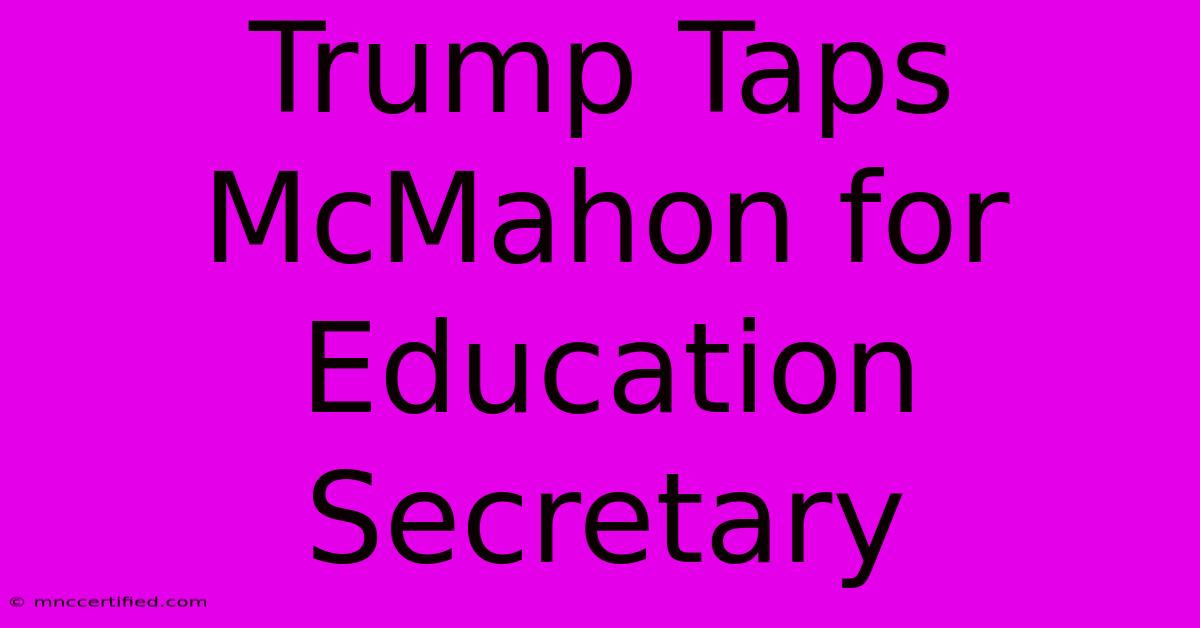Trump Taps McMahon For Education Secretary

Table of Contents
Trump Taps McMahon for Education Secretary: A Controversial Choice
On [Insert Date of Announcement], former WWE CEO Linda McMahon was surprisingly nominated by President Donald Trump to lead the Department of Education. This announcement sparked immediate debate, highlighting the significant divide in American politics regarding education policy and the qualifications of political appointees. This article delves into the key aspects of this controversial appointment, examining McMahon's background, her potential policy directions, and the public's reaction.
Linda McMahon: From WWE to Washington?
Linda McMahon's career is anything but typical for a potential Education Secretary. Co-founder and CEO of World Wrestling Entertainment (WWE) for over 30 years, she built the company into a global entertainment giant. This experience, while undeniably successful in the business world, is vastly different from the traditional background of education policymakers. This stark contrast formed the core of the criticism leveled against the appointment. Her business acumen, some argue, might be valuable in navigating the bureaucratic complexities of the Department, but her lack of experience in education policy raised significant concerns.
McMahon's Political Career: A Stepping Stone?
Before this nomination, McMahon had already dabbled in politics, running unsuccessfully for the U.S. Senate in Connecticut in 2010 and 2012. These campaigns, though unsuccessful, provided her with valuable political experience and connections within the Republican party. This prior political engagement, however, wasn't enough to fully quell the criticism surrounding her lack of educational expertise. Many questioned whether her political ambitions were the driving force behind this nomination, rather than any inherent suitability for the role.
Potential Policy Directions Under McMahon
Speculation on McMahon's potential policy directions as Education Secretary varied widely. Some analysts predicted a continuation of Trump's focus on school choice, potentially expanding charter schools and voucher programs. Others anticipated a more business-oriented approach to education reform, emphasizing efficiency and accountability. However, the lack of a clear public statement from McMahon herself regarding her specific educational philosophies fueled further uncertainty and speculation. This lack of transparency only intensified the concerns surrounding her suitability for the role.
Concerns About Deregulation and Funding
One major concern centered on the possibility of deregulation under McMahon's leadership. Critics worried that a business-oriented approach might prioritize cost-cutting over student well-being and educational quality. There were also concerns regarding funding for public education, with fears that McMahon might favor private school initiatives at the expense of public schools. These fears were exacerbated by Trump's own previous statements on education policy, which often emphasized privatization and deregulation.
Public Reaction and Political Fallout
The announcement was met with a mixed response. Supporters pointed to McMahon's successful business career as evidence of her management skills and ability to navigate complex organizational structures. Conversely, critics highlighted her lack of experience in education policy, fearing that her appointment would lead to detrimental changes in the education system. The appointment further polarized the already deeply divided American political landscape.
The Role of Media Coverage
Media coverage of the nomination was extensive and largely critical. News outlets emphasized McMahon's lack of educational credentials and explored the potential ramifications of her appointment. This critical media coverage significantly shaped public opinion and contributed to the intense debate surrounding the nomination. This underscores the importance of media representation in shaping public perception of political appointments.
Conclusion: A Legacy Yet to Be Written
Linda McMahon's nomination as Education Secretary was, and remains, a highly controversial decision. Her extensive business experience contrasts sharply with the traditional backgrounds of previous appointees. While her supporters emphasize her management skills, critics express serious concerns about her lack of educational expertise and potential policy directions. Only time will tell whether her appointment ultimately benefits or harms the American education system. The legacy of this appointment will depend on her actions and policies during her tenure. This continues to be a story worth watching, as its implications for American education will likely be felt for years to come.

Thank you for visiting our website wich cover about Trump Taps McMahon For Education Secretary. We hope the information provided has been useful to you. Feel free to contact us if you have any questions or need further assistance. See you next time and dont miss to bookmark.
Featured Posts
-
Morris County Police Investigate Drone Use
Nov 20, 2024
-
Bodie Kane And Marcus Investments
Nov 20, 2024
-
Check For 25 Cold Weather Payments
Nov 20, 2024
-
Fifa 2026 Argentina Vs Peru Live Stream
Nov 20, 2024
-
Investment Property In Costa Rica
Nov 20, 2024